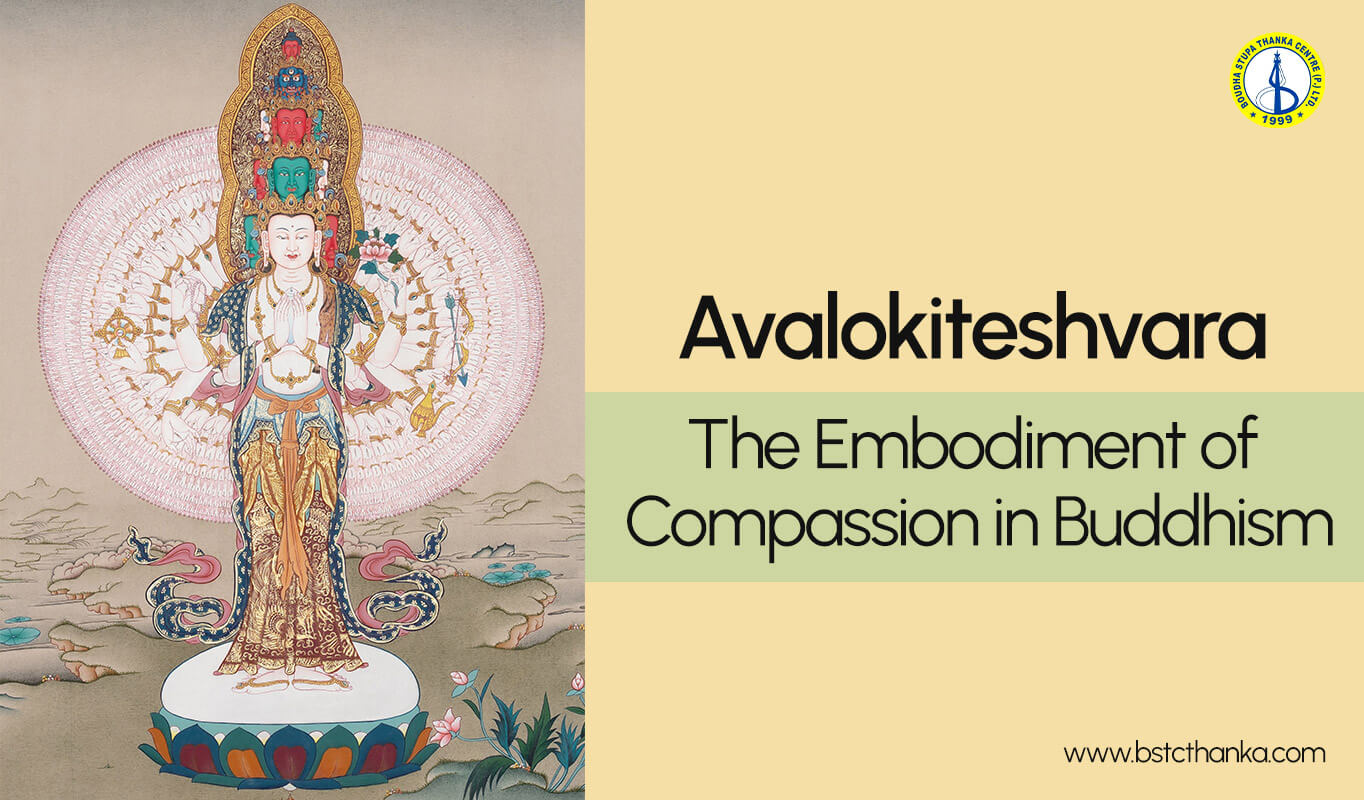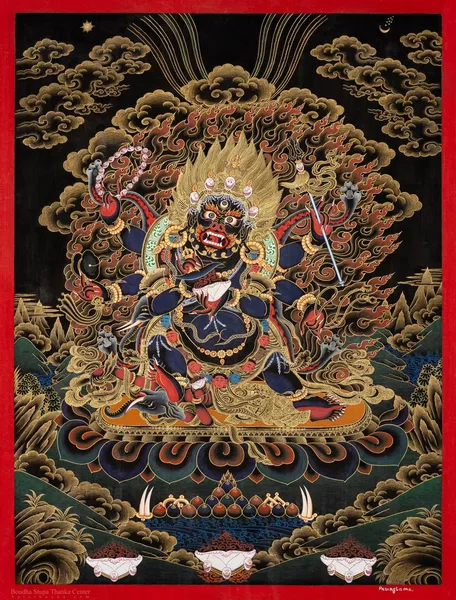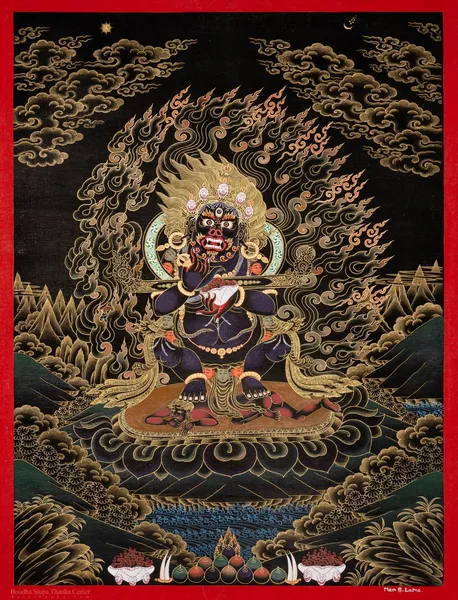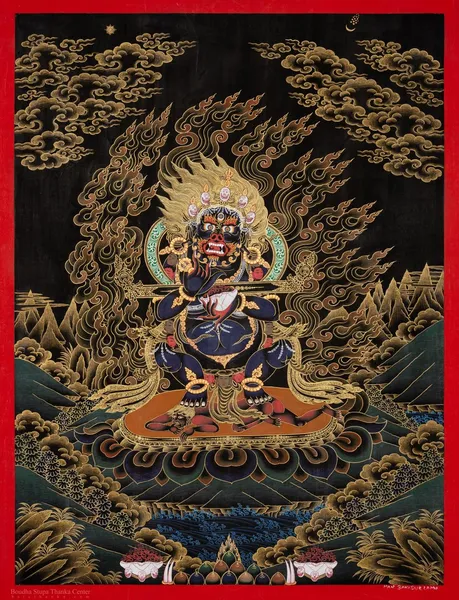
Avalokiteshvara
Across vast swaths of Asia, a name resonates with profound reverence: Avalokiteshvara, the Bodhisattva of Compassion. Revered in Mahayana Buddhism, Avalokiteshvara embodies the very essence of mercy and understanding, a beacon of hope for those lost in suffering. Avalokiteshvara is worshipped as peaceful deities in Buddhism and is traditionally illustrated in Avalokiteshvara thangka painting.
Thousand Arms to Embrace the World
Depictions of Avalokiteshvara vary, but a common image portrays a serene figure with thousands of arms, each reaching out to cradle the woes of countless beings. This powerful symbolism reflects Avalokiteshvara's boundless compassion. Each arm represents a skillful means to alleviate suffering, whether through wisdom, compassion, or unwavering kindness.
The Power of the Mantra: Om Mani Padme Hum
The mantra "Namo Ratna Traya ya," often associated with Avalokiteshvara, is a potent chant revered for its transformative power. Each syllable carries a deep meaning, urging the practitioner to cultivate compassion, wisdom, and liberation. Chanting this mantra is believed to purify negativity and awaken the bodhichitta nature within.
Avalokiteshvara - More than just a deity
Avalokiteshvara's significance transcends mere worship. He serves as a constant reminder to cultivate compassion in our daily lives. His story highlights the ideal of delaying one's own enlightenment to alleviate the suffering of others. This selfless act inspires us to integrate kindness and understanding into our interactions with the world.
Finding Avalokiteshvara Within
Avalokiteshvara's presence is not limited to distant iconography. The potential for compassion resides within each of us. Whenever we see others suffering, we feel a spark of compassion we feel.By actively seeking to understand and alleviate the suffering of others, we embody the essence of this bodhisattva. Whether it's a kind word to a stranger or a helping hand to someone in need, every act of compassion brings us closer to the awakened state Avalokiteshvara represents.
So, the next time you encounter hardship, remember the ever-compassionate Avalokiteshvara. Let his presence guide you towards a more compassionate existence, one that uplifts not only yourself but also those around you.
Avalokiteshvara FAQ
Avalokiteshvara, revered across Mahayana Buddhism, embodies the essence of compassion. This FAQ explores this beloved figure and their significance.
Q. Who is Avalokiteshvara?
Ans. Avalokiteshvara is a Bodhisattva, a being who delays their own enlightenment to help others achieve liberation from suffering. Their name translates to "the Lord who looks down with compassion."
Q. How is Avalokiteshvara depicted?
Ans. Depictions vary, but a common image portrays a serene figure with multiple arms, each reaching out to symbolize Avalokiteshvara's infinite capacity for compassion. Sometimes, they hold a lotus flower representing purity and a wish-fulfilling jewel symbolizing the ability to grant wishes.
Q. What is the significance of the mantra "Om Mani Padme Hum"?
Ans. This powerful mantra is often associated with Avalokiteshvara. Chanting it is believed to purify negativity, cultivate compassion and wisdom, and ultimately lead to liberation.
Q. Why is Avalokiteshvara important?
Ans. Avalokiteshvara is more than just a deity. They serve as a constant reminder to cultivate compassion in daily life. Their story highlights the ideal of postponing enlightenment to alleviate the suffering of others, inspiring us to integrate kindness and understanding into our interactions.
Q. How can I connect with Avalokiteshvara's energy?
Ans. Here are some ways:
Chanting the mantra "Om Mani Padme Hum"
Meditation: Visualizing Avalokiteshvara and reflecting on compassion.
Acts of kindness: Offering help to others embodies the essence of Avalokiteshvara.
Reciting prayers or mantras dedicated to Avalokiteshvara.
Q. Are there different forms of Avalokiteshvara?
A. Yes! Avalokiteshvara manifests in various forms, each with specific qualities. Some popular forms include:
Thousand-armed Avalokiteshvara: Representing boundless compassion and the ability to help countless beings.
Chenrezig: The Tibetan form of Avalokiteshvara, associated with compassion.
Q. Where can I learn more about Avalokiteshvara?
A. Explore Buddhist texts, visit a Buddhist temple, or seek guidance from a Buddhist teacher. Numerous online resources offer in-depth information about Avalokiteshvara and Mahayana Buddhism.







